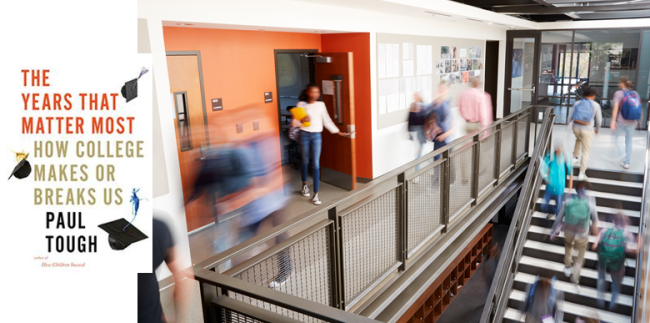You have /5 articles left.
Sign up for a free account or log in.

Monkey Business Images / iStock
Paul Tough, author of How Children Succeed: Grit, Curiosity, and the Hidden Power of Character, is well known for his writing on children's lives.
With The Years That Matter Most: How College Makes Us or Breaks Us (Houghton Mifflin Harcourt), Tough tracks what happens to those who go -- or try go to -- college. A major part of the book is profiles that Tough writes of real students struggling with various aspects of going to college.
There's KiKi, who's at Princeton University, grateful to be admitted with a scholarship, but quite alone. "My definition of low income is a lot different from Princeton's definition of low income," KIKi says. She was invited to a seven-week orientation for first generation students, but she found few of the students to be genuinely poor. Most were working class or lower middle class. Few were black like she is.
There's Kim, who lives in Taylorsville, N.C. (in the far western part of the state). Kim has a 4.5 grade-point average, with a full slate of Advanced Placement courses. Yet she's terrified of dropping out of college. "That scares me a lot," she said. "I'm horrified by the fact that I might end up back here. I've seen a lot of people do it. They'll be like, 'I'm going to college!' And they'll go and then drop out and come right back home."
Though her fears are common, she wasn't getting much advice on the value of college or where to go.
The book is a mix of interviews like those with Kiki and Kim, and the discussions of policy issues that can help or hurt them.
Tough is in some ways an unlikely narrator of what works and what doesn't in higher education. He does not have a college degree.
A Canadian by birth, he now lives in Austin, Tex., and Montauk, N.Y. He attended McGill University and Columbia University, and said he "spent a lot of time trying to figure out" why he left. At Columbia, he said, he took an internship at Harper's, and always intended to go back.
Looking at American colleges, Tough said he thinks the pressure on working-class families is severe. "We're not giving those students the options and support they need."
He said he doesn't feel the need to write about wealthy students. "Rich kids are so over-reported," he says. Tough says that we do need to spend more money on low-income kids. Some of the institutions he writes about in the book -- Georgia State University, for example -- have done well without surplus funds.
The top problem he did see (and writes about) is the "enormous pressure" students are under. But wealthy students "don't see that the system is designed for them."
The SAT
One part of the book is likely to be controversial -- Tough's critique of the SAT.
"I think the SAT can be useful," he said. Standardized tests like the SAT "are a useful indicator for those who have advantages." But "they are pretty narrow."
Ultimately, his major problem with the test, he said, "is that it correlates with wealth."
He said that he was surprised in the reporting of his book "by the incredible power of the SAT and the ACT." He reserves his harshest criticism for the SAT. During the past few years, Tough said, the College Board has put a lot of effort into making itself seen as a force for good. He finds evidence that the College Board is concerned with its own condition.
Tough reviews the history of the ACT and the SAT. The SAT was founded to test those who wanted to go to the Ivies. The ACT roots are in the large university of the Midwest. More recently, both tests have spread nationally, Tough says, causing "identity crises" for the College Board.
"[A]s the SAT expanded, evidence mounted that the students who tended to excel on the test looked a lot like the scions of those old aristocracy," Tough writes. "Rich kids reliably did better than poor kids; white did better than blacks."
David Coleman, president of the College Board, admitted some years ago that the SAT favored certain (generally wealthy) students and vowed to change the test.
But the results don't impress Tough. He describes an interview with Coleman in which he read a statement about the College Board's efforts to help low-income students that didn't make sense. Coleman admitted "I actually don't understand it myself."
Even efforts to deal with the problem have not worked, Tough writes. He recalls asking Sal Khan about his worry that Khan Academy videos -- touted by the College Board as a free tool to reduce the economic gap in scores -- would work best with knowledgeable parents to help their children. Khan agreed.
The College Board released a critique of Tough's book.
"We were eager to share our work to deliver more opportunities for students. That's why we gave Tough broad access to our team members, programs, and research during his six years of reporting. We also provided a wealth of information about our programs, including access to new initiatives still in their early stages. We thought it was important to show how the College Board decides to take risks on big ideas and tackle entrenched social problems. We were open about the difficult, uneven work of pushing for change," the critique said.
It added: "Unfortunately, the book grossly misrepresents the College Board’s work in addressing those challenges. It’s disheartening to see our good-faith engagement so harshly caricatured. Mr. Tough not only distorts the work we do, but also the motives that drive it. At a time when educational equity needs all the allies it can get, we’re disappointed by his eagerness to attack those who don’t share his view about the best way forward."
Specifically, the College Board cites evidence that there is value in the SAT.
"As our own research shows, grades are slightly more predictive than SAT scores over all. Taken together, however, grades and SAT scores are much more predictive than either alone – 15 percent more on average. And as Mr. Tough's own reporting on the University of Texas illustrates, the SAT gives colleges critical insight into the level of preparation students are bringing to college, allowing campuses to target support programs and resources where they’ll do the most good. UT requires all incoming students to take the SAT in part for this reason," the College Board says.
While Tough is not against the SAT for everyone, he argues that test-optional admissions would be a better way.








